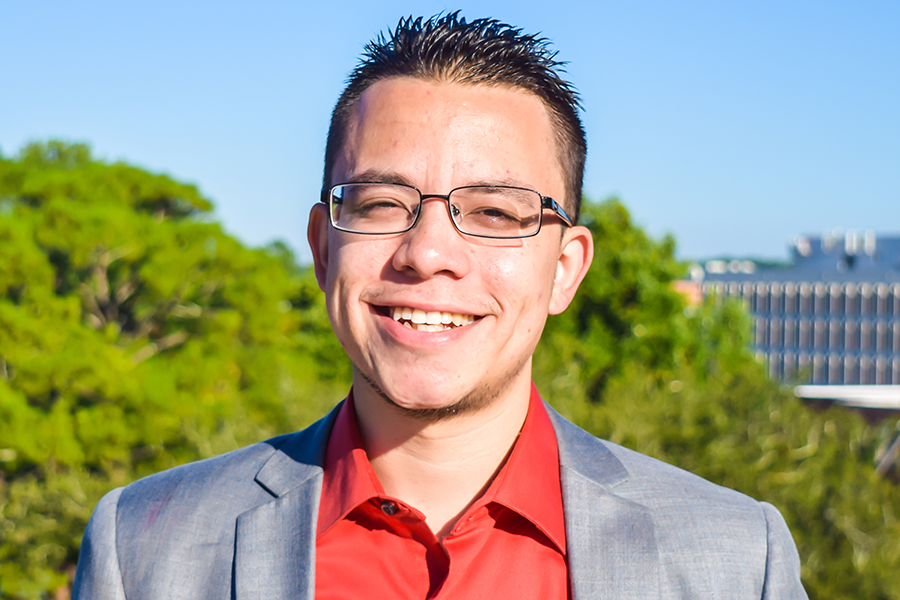Eduardo Fuste

"Sow a seed, cultivate its growth."
College: Business
Degree Program: Accounting
Degree: Doctorate
Award: McKnight Doctoral Fellowship (2016)
Why FSU?
My dream is to become a professor, produce high-quality research, and inspire (i.e. sow a seed, cultivate its growth) my students to understand that no matter their current limitations or challenging background, they can attain a college education to propel them to their highest aspirations. Although the dream is very clear, the path was not. After an intense interview process with different PhD programs, I found my best opportunity at Florida State University, but that required moving to another city where it would be difficult for my parents to offer financial support.
Motivation to pursue a graduate degree
Perhaps quite similar to many Latino Americans, my parents never pursued bachelor’s degrees or graduate degrees in this country. My parents worked really hard to fund a good portion of my bachelor’s degree in accounting, but funding my master’s degree in accounting was out of the question since they had to help my brother pay for his bachelor’s degree study. Using funds from a paid internship at PricewaterhouseCoopers, a few scholarships that I won, and FAFSA subsidized loan, I covered the costs of my master’s and worked full-time at PricewaterhouseCoopers to pay back the loan. During my master’s degree, one of my professors planted a seed in my heart about accounting research and a professor’s life. Throughout the program, several professors cultivated the seed by encouraging me to think more critically, read and write more effectively, and discuss research papers after class. One year after working full-time, I felt the seed grow, and my heart called me to pursue a doctoral degree.
Importance of research and work
I enjoy exploiting unique settings and forecasting data to examine how public disclosures and managerial decisions affect the allocation of financial resources in the capital markets. My research is focused on two areas of financial disclosure topics. First, I investigate how investors perceive accounting information disclosed in a unique setting (e.g., major tax reform). Second, I evaluate the information content of voluntary disclosures for the capital markets.
My dissertation relies on a unique setting, The Tax Cuts and Jobs Act of 2017 (or TCJA), which was the largest U.S. tax reform in over thirtyyears. The TCJA was enacted into law following a brief legislative process in Congress of less than two months and involved substantial changes to corporate tax law. My dissertation examines an important consequence of the legislative process around major tax law change: higher information asymmetry between sophisticated and less sophisticated investors. When the legislative process publicly discloses new information about the TCJA’s proposed tax policies, sophisticated investors use superior resources and skills to process information about the proposed policies more quickly than less sophisticated investors. As sophisticated investors trade in the stock market on this acquired information with less sophisticated investors, information asymmetry increases between investors about a firm’s valuation. During the legislative process leading up to the TCJA’s enactment, I find that economic uncertainty about proposed tax policies in the TCJA relates to greater information asymmetry between investors. Higher levels of information asymmetry relate to costly market consequences such as lower stock liquidity and higher cost of equity capital that makes it more expensive for companies to raise funds in the stock market.
Accomplishments during graduate career
I have accepted a tenure-track assistant professor of accounting position at Baruch College - CUNY to begin employment in the Spring 2022 semester. Furthermore, on October 6, 2021, I successfully defended my dissertation. Throughout the past academic year 2020-2021, I was invited to present my dissertation at prestigious conferences such as the Journal of the American Taxation Association Conference and at several peer universities such as Indiana University and Baruch College - CUNY. More recently, I was accepted to present a co-authored research paper with Dr. Tianming Zhang from the FSU Department of Accounting in mid-October 2021 at the Harvard Rising Scholars Conference. As such, I will be presenting a research paper to Harvard Business School faculty.
Impact of Fellowships and Awards on Graduate Education
Becoming a McKnight Doctoral Fellow meant that I would receive the financial support needed to cover the cost of moving to a new city and the cost that comes with pursuing a doctoral degree. I also received invaluable mentorship, moral support, and writing assistance from other Fellows in the McKnight family who understand the challenges of pursuing a doctoral degree.
